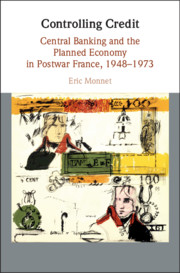
-
Select format
-
- Publisher:
- Cambridge University Press
- Publication date:
- 29 October 2018
- 15 November 2018
- ISBN:
- 9781108227322
- 9781108415019
- 9781108400084
- Dimensions:
- (228 x 152 mm)
- Weight & Pages:
- 0.62kg, 350 Pages
- Dimensions:
- (229 x 152 mm)
- Weight & Pages:
- 0.5kg, 354 Pages
- Subjects:
- Economics, Macroeconomics, Economic Theory, History, Economic History
- Series:
- Studies in Macroeconomic History
You may already have access via personal or institutional login- Subjects:
- Economics, Macroeconomics, Economic Theory, History, Economic History
- Series:
- Studies in Macroeconomic History
Book description
It is common wisdom that central banks in the postwar (1945–1970s) period were passive bureaucracies constrained by fixed-exchange rates and inflationist fiscal policies. This view is mostly retrospective and informed by US and UK experiences. This book tells a different story. Eric Monnet shows that the Banque de France was at the heart of the postwar financial system and economic planning, and that it contributed to economic growth by both stabilizing inflation and fostering direct lending to priority economic activities. Credit was institutionalized as a social and economic objective. Monetary policy and credit controls were conflated. He then broadens his analysis to other European countries and sheds light on the evolution of central banks and credit policy before the Monetary Union. This new understanding has important ramifications for today, since many emerging markets have central bank policies that are similar to Western Europe's in the decades of high growth.
Awards
Winner (for dissertation), 2013 Alexander Gerschenkron Prize for the Best Dissertation in non-US or Canadian Economic History, Economic History Association
Winner (for dissertation), 2015 Twentieth Century Prize, International Economic History Association
Reviews
'How central banks and governments used directed credit to positively influence post-World War II economic recovery and growth - and why similar policies do not work today - is one of the great unsolved mysteries of twentieth-century economic history. In this pathbreaking volume, Eric Monnet uses the French case to shed important new light on the question.'
Barry Eichengreen - George C. Pardee and Helen N. Pardee Professor of Economics and Political Science, University of California, Berkeley
'Monnet’s intensive study of the Banque de France during the Trente Glorieuses sheds new light on the development of credit policy in the decades before the central banking orthodoxy of the 2000s. It thus makes an important contribution to understanding the development of central banking in Europe and reminds us of the heterogeneity of central bank practice in the twentieth century.'
Catherine Schenk - University of Oxford
‘Controlling Credit is a valuable book and will remain an inescapable reference in the emerging literature about postwar central banking.’
Stefano Ugolini Source: Journal of Interdisciplinary History
Contents
Metrics
Altmetric attention score
Full text views
Full text views help Loading metrics...
Loading metrics...
* Views captured on Cambridge Core between #date#. This data will be updated every 24 hours.
Usage data cannot currently be displayed.
Accessibility standard: Unknown
Why this information is here
This section outlines the accessibility features of this content - including support for screen readers, full keyboard navigation and high-contrast display options. This may not be relevant for you.
Accessibility Information
Accessibility compliance for the PDF of this book is currently unknown and may be updated in the future.


